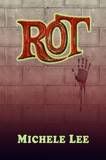Rot / Michele Lee
 Skullvines Press / August 2009
Skullvines Press / August 2009
Reviewed by: Vince A. Liaguno
Zombie outbreaks are about as commonplace in horror fiction as reality shows are on television these days, having seemingly eclipsed haunted houses and werewolves combined and perhaps only second in market saturation to the vampire. We’ve seen the undead take to the high seas (Brian Keene’s Dead Sea) and hobnob with the likes of Jane Austen (Seth Grahame-Smith’s Pride and Prejudice and Zombies) and Dante Alighieri (Kim Paffenroth’s Valley of the Dead). There have been manuals written on how to survive a zombie attack (Max Brooks’ The Zombie Survival Guide) and even a book of zombie Christmas carols (Michael Spradlin’s It’s Beginning to Look a Lot Like Zombies). Even Chicago’s Columbia College offers a three-credit course on the undead called Zombies in Popular Media.
But just when the sub-genre appears ready to cannibalize itself with cuteness, along comes something with some real…meat.
Michele Lee’s Rot is an impressive debut novella that applies everything we’ve come to know as readers about the zombie and adds a weighty sociological twist that will surprise in its implications.
The Silver Springs Specialty Care Community is a residential care facility for the undead who are willed back to life by loved ones not ready to let go only to be promptly discarded when the realities of caring for a loved (undead) one prove too much to bear. The facility offers daily exercise and raw meat to keep zombie hunger at bay, and even a promise to re-kill the undead resident upon his or her inevitable decline into savagery or complete decay.
Enter protagonist Dan, a retired military veteran whose combat training makes him an ideal security guard at Silver Springs. During his first day on the job, he meets a pair of higher-functioning zombies — Amy, an endearingly sarcastic twenty-something four days back from a fatal stroke and placed in Silver Springs because of her husband’s inability to touch her again after resurrecting her, and Patrick, an openly gay man killed in an accident and restored to life by parents convinced his homosexuality would damn his soul to hell for all eternity. Despite his misgivings, Dan bonds with the pair, who have been assigned to help him with office work. The revelation that both Amy and Patrick are being abused by the facility’s staff prompts Dan to investigate Silver Springs’ resident files, and he quickly discovers that zombie residents are disappearing from the facility. When Amy suddenly goes missing, Dan reluctantly teams up with Patrick to save her and, in the process, the pair uncovers an insidious plot that involves corporate greed and the depths of depravity man will sink in his quest for entertainment.
Using widely-accepted zombie mythos as a framework, Lee crafts an ingenious allegory for the warehousing of the elderly in America. As a nursing home administrator, I was struck (repeatedly, as if in the head by a sledgehammer) by the similarities in how Lee’s fictional undead were mistreated, discarded, and overall discounted by an uncaring, on-the-go society moving too fast to realize the contributions still able to be made and the apathy with which much of our society (barely) considers the old and infirm. Thankfully, government regulations (connected to payment sources) protect the real-life institutionalized elderly from enduring the same fate as the denizens of Silver Springs when they run out of money to cover their stay, but the very human aspects of abandonment, dehumanization, and an outside life moving on without you ring loud and true in Lee’s surprisingly insightful tale.
As the fictional world in Lee’s Rot demonstrates no respect for the dead by not allowing them eternal peace for a life well-lived, neither do we, by and large, show respect for the contributions of older adults, often relegating them to self-contained communities – both in the physical and psychological sense – and failing to tap into the wealth of knowledge and experience they possess. Like the residents of Silver Springs, our elderly are reduced to inconvenient visits and sources of burden upon the young and able. But while most build defense mechanisms to avoid facing that unpleasant and ugly reality, Lee uses the widespread appeal of the zombie to lull us into a false sense of security, springing that same ugly, hard-to-digest reality on the unsuspecting reader. Prepared for bloodlust but confronted with stark, human truth, the reader will be jolted in a way no recent ghost story, vampire tale, or urban legend could achieve. That, dear readers, is the discomfiting effect of true horror.
That said, Lee isn’t completely off the hook. After quickly finishing this meager 53-page story, one is left wondering why the author didn’t recognize the ingenuity of her own material and opt for full-length novel treatment here. Indeed, there are lost opportunities aplenty for exploring more of this “civilized” world in which living and undead co-exist and the complexities of the human-zombie dynamic. Surely there were more layers to be unfolded: perhaps an exploration of the other side – the caregiver – which here seems committed to one-dimensional villainy in the interest of time. Or the idea of further exploitation of the undead, hinted at here in the form of zombie escorts.
Word count and missed opportunities aside, Rot still stands as a notable piece of work worthy of readers’ attention. Blending bloodshed and perceptive humanistic commentary, Lee creates a singularly unique entry in the zombie canon, one likely to cause readers to wince as much from the rawness of the human emotion at play here as the visceral images of flesh ripping from bone.
Purchase Rot by Michele Lee.



